- Home
- Fannie Flagg
Fried Green Tomatoes at the Whistle Stop Cafe Page 2
Fried Green Tomatoes at the Whistle Stop Cafe Read online
Page 2
“The railroad tracks ran right across the backyard, and on summer nights that yard would be just full of lightning bugs and the smell of honeysuckle that grew wild, right alongside the tracks. Poppa had the back planted with fig trees and apple trees, and he had built Momma the most beautiful white lattice grape arbor that was full of wisteria vines … and little pink sweetheart roses grew all over the back of the house. Oh, I wish you could have seen it.
“Momma and Poppa Threadgoode raised me just like I was one of their own, and I liked all the Threadgoodes. Especially Buddy. But I married Cleo, his older brother, the chiropractor, and wouldn’t you know it, later on I turned out to have a bad back, so it worked out just fine.
“So you can see I’ve been keeping up with Idgie and the Threadgoodes all my life. And I’ll tell you, it’s been better than a picture show … yes it has. But then, I was always a tagalong sort of person. Believe it or not, I never did talk much until after I hit my fifties, and then I just couldn’t stop. One time Cleo said to me, ‘Ninny’—my name is Virginia but they called me Ninny—he said, ‘Ninny, all I hear is Idgie said this and Idgie did that.’ He said, ‘Don’t you have anything better to do than to hang around that cafe all day?’
“I thought long and hard and said, ‘No, I don’t’ … not to downgrade Cleo in any way, but it was the truth.
“I buried Cleo thirty-one years ago last February, and I often wonder if I hurt his feelings when I said that, but I don’t think so, because after all was said and done, he loved Idgie as much as the rest of us, and always got a good laugh out of some of her doings. She was his baby sister, and a real cutup. She and Ruth owned the Whistle Stop Cafe.
“Idgie used to do all kinds of crazy harebrained things just to get you to laugh. She put polker chips in the collection basket at the Baptist church once. She was a character all right, but how anybody ever could have thought that she killed that man is beyond me.”
For the first time, Evelyn stopped eating and glanced over at the rather sweet-looking old lady in the faded blue flower-print dress, with the silver-gray fingerwaves, who didn’t miss a beat:
“Some people thought it started the day she met Ruth, but I think it started that Sunday dinner, April the first, 1919, the same year Leona married John Justice. I can tell you it was April the first, because Idgie came to the dinner table that day and showed everybody this little white box she had with a human finger inside of it, resting on a piece of cotton. She claimed she’d found it out in the backyard. But it turned out to be her own finger she had poked through a hole in the bottom of the box. APRIL FOOL!!!
“Everybody thought it was funny except Leona. She was the oldest and the prettiest sister, and Poppa Threadgoode spoiled her rotten … everybody did, I guess.
“Idgie was about ten or eleven at the time and she had on a brand new white organdy dress that we’d all told her how pretty she looked in. We were having a fine time and starting in on our blueberry cobbler when all of a sudden, out of a clear blue sky, Idgie stood up and announced, just as loud … ‘I’m never gonna wear another dress as long as I live!’ And with that, honey, she marched upstairs and put on a pair of Buddy’s old pants and a shirt. To this day, I don’t have any idea what set her off. None of us had.
“But Leona, who knew Idgie never said a thing she didn’t mean, began to wail. She said, ‘Oh Poppa, Idgie’s going to ruin my wedding, I just know it!’
“But Poppa said, ‘Now, baby girl, that’s just not so. You’re gonna be the most beautiful bride in the entire state of Alabama.’
“Poppa had this great big handlebar moustache … then he looked at us and he said, ‘Isn’t that right, children?’… and we all put in our two cents’ worth to make her feel better and to get her to shut up. All of us except Buddy, that is, who just sat there and giggled. Idgie was his pet, so anything she did was all right with him.
“So anyway, Leona was finishing her cobbler, and just when we thought she was all calmed down, she screamed so loud that Sipsey, the colored woman, dropped something in the kitchen. ‘Oh Poppa,’ Leona said, ‘what’s gonna happen if one of us dies?’
“… Well, it was a thought, wasn’t it?
“We all looked at Momma, who just put her fork down on the table. ‘Now, children, I’m sure your sister will make that one small concession and wear a proper dress if and when that time ever comes. After all, she’s stubborn, but she’s not unreasonable.’
“Then, a couple of weeks later, I heard Momma tell Ida Simms, the seamstress for the wedding, that she was gonna need a green velvet suit with a bow tie, for Idgie.
“Ida looked up at Momma kinda funny and said, ‘A suit?’ … And Momma said, ‘Oh I know, Ida, I know. I tried my best to get her to wear something a little more weddinglike, but that child has a mind of her own.’
“And she did, even at that age. I think she wanted to be like Buddy, myself … oh, those two were a mess!” The old lady laughed.
“One time, they had this raccoon named Cookie, and I used to spend hours watching him try to wash a cracker. They’d put a little pan of water out in the backyard, and then they’d give him a soda cracker, and he’d wash cracker after cracker, and never could figure out what happened to it when it would disappear. Each time, he’d look at his little empty hands and be so surprised. Never did figure out where his cracker was going. He spent a good part of his life washing crackers. He’d wash cookies, too, but that wasn’t as funny … he washed an ice cream cone once …
“Oh, I better quit thinking about that raccoon or they’re gonna think I’m as crazy as Mrs. Philbeam, down the hall. Bless her heart, she thinks she’s on the Love Boat, headed for Alaska. A lot of these poor souls out here don’t even know who they are.”
Evelyn’s husband, Ed, came to the door of the lounge and motioned. Evelyn wadded up her candy wrappers and put them in her purse and got up.
“Excuse me, that was my husband. I think he’s ready to go.”
Mrs. Threadgoode looked up, surprised, and she said, “Oh? Do you hafto?”
Evelyn said, “Yes, I think I better. He’s ready to leave.”
“Well, I’ve enjoyed talking to you … what’s your name, honey?”
“Evelyn.”
“Well, you come back and see me, y’hear? I’ve enjoyed talk-in’ to you … bye-bye,” she called after Evelyn, and waited for another visitor.
OCTOBER 15, 1929
Ownership of Meteorite Questioned
Mrs. Vesta Adcock and her son, Earl Jr., have claimed that they are the rightful owner of the meteorite because she said that the Otises rented the house that the meteorite hit from her, and so it is her house and her meteorite.
Mrs. Biddie Louise Otis was questioned on the matter and it is her contention that the meteorite is hers because it was her radio that it hit. Her husband, Roy, who is a brakeman for the Southern Railroad, was working late shift and was not home at the time, but said it was not unusual because in 1833, 10,000 meteors fell in one night and that this was just one, and nothing to make a fuss about.
Biddie said she thought she’d keep it as a souvenir, anyhow.
By the way, is it just my imagination or are times getting harder these days? My other half says that five new hobos showed up at the cafe last week, looking for something to eat.
… Dot Weems …
OCTOBER 15, 1929
Five men sat huddled around a low-burning fire, orange and black shadows dancing on their faces as they drank weak coffee out of tin cans: Jim Smokey Phillips, Elmo Inky Williams, BoWeevil Jake, Crackshot Sackett, and Chattanooga Red Barker—five of the estimated two hundred thousand men and boys roaming the countryside that year.
Smokey Phillips looked up but said nothing; and the rest of them said the same. They were tired and weary that night, because that cold nip in the night air meant the start of another raw, heartless winter, and Smokey knew he would have to be starting south soon, with the great flocks of geese, just as he had done for so many years now.
He was born on a frosty morning, back up in the Smoky Mountains of Tennessee. His daddy, a knobby-legged man, a second-generation moonshiner who had fallen in love with his own product, made the fatal mistake of marrying a “good woman,” a plain country girl whose life revolved around the Pine Grove Free Will Baptist Church.
Most of Smokey’s childhood had been spent sitting on hard wooden benches for hours, with his little sister, Bernice, at all-day singings and foot washings.
In the regular church services, his mother had been one of the women who would occasionally stand up and start babbling, out of her head, in an unknown tongue.
Eventually, as she became more and more filled with the Spirit, his father became less so and stopped going to church altogether. He told his children, “I believe in God, but I don’t think you have to go crazy to prove it.”
Then, one spring when Smokey was eight, things got worse. His mother said that the Lord had told her that her husband was evil and devil-possessed, and she turned him in to the revenue agents.
Smokey remembered the day they brought his daddy down the path from the still with a gun at his back. As he passed by his wife, he looked at her, dumbfounded, and said, “Woman, don’t you know what you’ve done? You’ve done took the bread right out of your own mouth.”
It was the last Smokey ever saw of him.
After his father left, his mother really went off the deep end and got mixed up with a bunch of backwoods Holy Roller snake handlers. One night, after an hour of ranting and beating the Bible, the red-faced, wild-haired preacher got his barefoot congregation all excited. They were all chanting and stomping their feet when suddenly he reached into a potato sack and pulled out two huge rattlesnakes and started waving them around in the air; lost in the Spirit.
Smokey froze in his seat and squeezed his sister’s hand. The preacher was dancing around, calling out for believers to take up the serpent and cleanse their souls in the faith of Abraham when his mother ran up, grabbed one of the snakes away from him, and looked it right in the face. She began babbling in the unknown tongue, the whole time staring into the snake’s yellow eyes. Everybody in the room began to sway and moan. As she started to walk around the room with it, people began falling down on the floor, jerking and screaming and rolling around under the pews and up and down the aisles. The place was in a frenzy, while she babbled on … “HOSSA … HELAMNA … HESSAMIA …”
Before he knew what was happening, his little sister, Bernice, broke away from him, and ran up to her mother and pulled her by the hem of her dress.
“Momma, don’t …!”
Still wild-eyed and in a trance, she glanced down at her child for one split second, and in that second the rattler lunged and struck the woman in the side of her face. She looked back at the snake, stunned, and he struck again, fast and hard this time, striking her in the neck, the fangs puncturing her jugular vein. She dropped the angry serpent with a thud, and it crawled contemptuously away down the aisle.
His mother looked around the room that was now as silent as death, with a surprised look on her face, and as her eyes glazed over, she sank slowly to the floor. She was dead in less than a minute.
In that moment, his uncle had picked up Smokey and was headed out the door. Bernice went to live with a neighbor, and Smokey stayed at his uncle’s house. Then, when he was thirteen, he headed down the railroad tracks toward nowhere, and never came back.
The only thing he took was a photograph of his sister and him. He would take it out every once in awhile. There they were in the fading photograph, with their lips and cheeks painted pink: a little chubby girl with bangs and a pink ribbon tied around her head, wearing a tiny string of pearls; and he sat just behind her, his brown hair slicked down, his cheek pressed close to hers.
He often wondered how Bernice was doing and thought he’d look her up one of these days, if he ever got back on his feet.
When he was about twenty or so, he lost the picture when some railroad bull detective kicked him off a freight, into a cold, yellow river somewhere in Georgia, and now he hardly ever thought about her; except when he happened to be on a train, passing through the Smoky Mountains at night, on his way to somewhere else …
This morning, Smokey Phillips was on a mixed train from Georgia, headed for Florida. He had not eaten anything for two days and remembered that his friend Elmo Williams had told him there were two women running a place right outside of Birmingham who were always good for a meal or two. On the way down he’d seen the name of the cafe written on the walls of several boxcars, so when he saw the sign WHISTLE STOP, ALABAMA, he jumped off.
He found the place across the tracks, just like Elmo had said. It was a small green building with a green-and-white awning under a Coca-Cola sign that said THE WISTLE STOP CAFE. He went around the back and knocked on the screen door. A little black woman was busy frying chicken and slicing green tomatoes. She glanced at him and called out, “Miz Idgie!”
Pretty soon, a good-looking, tall blonde with freckles and curly hair came to the door, wearing a clean white shirt and men’s trousers. She looked to be in her early twenties.
He took off his hat. “Excuse me, ma’am, I was wondering if you had an odd job, or something I might do. I’ve had a run of some bad luck, lately.”
Idgie looked at the man in the worn-out dirty jacket, frayed brown shirt, and cracked leather laceless shoes and knew he wasn’t lying.
She opened the door and said, “Come on in, fella. I think we can find something for you.”
Idgie asked what his name was.
“Smokey, ma’am.”
She turned to the woman behind the counter. Smokey hadn’t seen a neat and clean woman in months, and this one was the prettiest woman he had seen in his entire life. She was wearing a dotted swiss organdy dress and had her auburn hair pulled back with a red ribbon.
“Ruth, this is Smokey, and he’s gonna be doing some work for us.”
Ruth looked at him and smiled. “That will be fine. Nice to meet you.”
Idgie pointed to the men’s room. “Why don’t you go in there and freshen up, and then come have a bite to eat.”
“Yes ma’am.”
The bathroom was big and had a light bulb hanging down from the ceiling, and when he pulled it he saw that there was a big stand-up claw-foot tub over in the corner, with a black rubber stopper on a chain. On the sink, already laid out, was a razor and a dish of shaving soap with a brush.
As he looked at himself in the mirror, he felt ashamed that they had seen him so dirty, but he had not had more than a speaking acquaintance with soap for quite a while now. He took the big bar of brown Oxydol soap and tried to scrub all the grime and coal dust off his face and hands. He had not had a drink in twenty-four hours, and his hands shook so bad he was not able to get a clean shave, but he did the best he could. After he had splashed himself with the Old Spice shaving lotion and combed his hair with the Ace comb he had found on the shelf above the sink, he came back out into the cafe.
Idgie and Ruth had set a place for him at a table. He sat down to a plate of fried chicken, black-eyed peas, turnip greens, fried green tomatoes, cornbread, and iced tea.
He picked up his fork and tried to eat. His hands were still shaking and he was not able to get the food to his mouth. He spilled his tea all over his shirt.
He had been hoping they were not watching, but in a minute the blond woman said, “Smokey, come on, let’s take a walk outside.”
He got his hat and used his napkin, thinking he was being thrown out. “Yes’m.”
She walked him out behind the cafe, where there was a field.
“You’re a pretty nervous fella, aren’t you?”
“I’m sorry about spilling my food in there, ma’am, but to tell you the honest to God truth … well … I’ll just head on, but thank you anyway …”
Idgie reached in her apron pocket and pulled out a half-pint bottle of Old Joe Whiskey and handed it to him.
He was a mighty a
ppreciative man. He said, “God bless you for a saint, ma’am,” and they sat down on a log out by the shed.
While Smokey was calming his nerves, she talked to him.
“See that big plot of empty land over there?”
He looked over. “Yes’m.”
“Years ago, that used to be the most beautiful little lake in Whistle Stop … in the summer, we’d swim in it and fish, and and you could go for a boat ride if you wanted to.” She shook her head sadly. “I sure do miss it, I sure do.”
Smokey looked at the vacant land.
“What happened to it, did it dry up?”
She lit a cigarette for him. “Naw, it was worse than that. One November, a big flock of ducks, oh, about forty or more, landed right smack in the middle of that lake, and while they were sitting there, that afternoon, a fluke thing happened. The temperature dropped so fast that the whole lake froze over, as solid as a rock, in a matter of three seconds. One, two, three, just like that.”
Smokey was amazed at the thought. “You don’t mean it?”
“Yep.”
“Well, I reckon it must have killed them ducks.”
Idgie said, “Why, hell no. They just flew off and took the lake with ’em. That lake’s somewhere in Georgia, to this very day …”
He turned and looked at her, and when he realized she was pulling his leg, his blue eyes crinkled up and he started laughing so hard that he started to cough at the same time, and she had to bang him on the back.
He was still wiping his eyes when they went back in the cafe, where his dinner was waiting. When he sat back down to eat, it was warm. Someone had kept it in the oven for him.
Oh, where is my wandering boy tonight
The boy of his mother’s pride…
Oh, he’s counting the ties
With a bed on his back
Or else he’s dinging a ride …
Oh, where is my boy tonight?
OCTOBER 22, 1929
Meteorite to Be on Display at Cafe

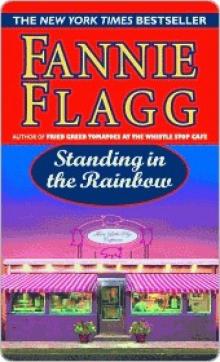 Standing in the Rainbow
Standing in the Rainbow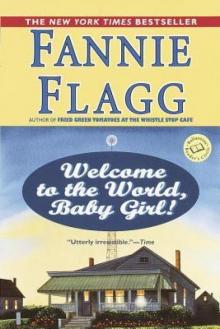 Welcome to the World, Baby Girl!
Welcome to the World, Baby Girl!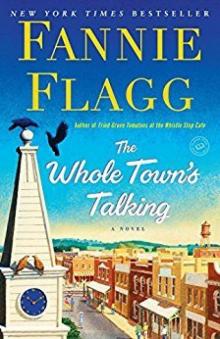 The Whole Town's Talking
The Whole Town's Talking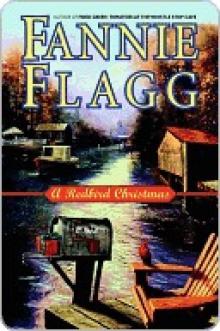 A Redbird Christmas
A Redbird Christmas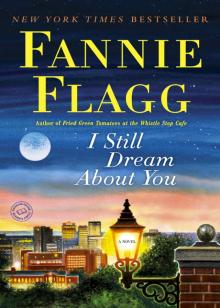 I Still Dream About You
I Still Dream About You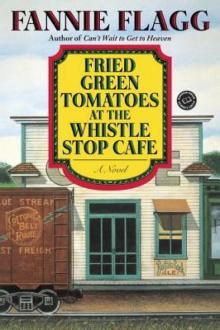 Fried Green Tomatoes at the Whistle Stop Cafe
Fried Green Tomatoes at the Whistle Stop Cafe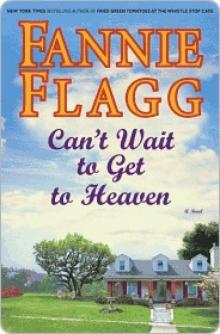 Can't Wait to Get to Heaven
Can't Wait to Get to Heaven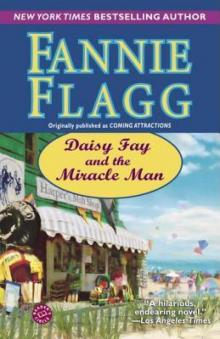 Daisy Fay and the Miracle Man
Daisy Fay and the Miracle Man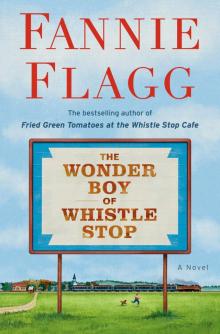 The Wonder Boy of Whistle Stop
The Wonder Boy of Whistle Stop The All-Girl Filling Station's Last Reunion
The All-Girl Filling Station's Last Reunion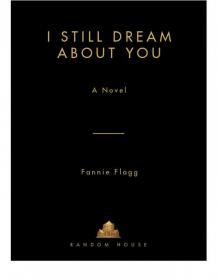 I Still Dream About You: A Novel
I Still Dream About You: A Novel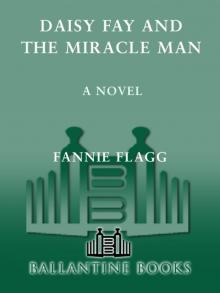 Daisy Fay and the Miracle Man: A Novel
Daisy Fay and the Miracle Man: A Novel